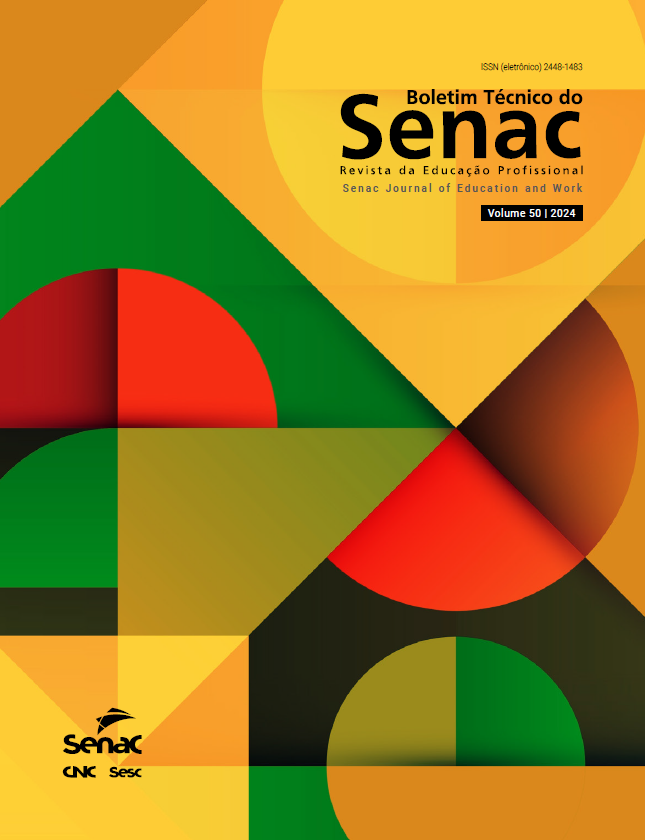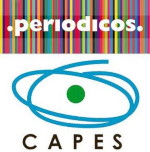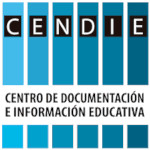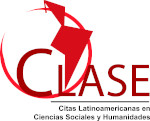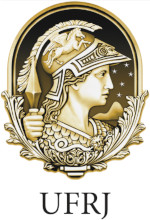USE OF THE INTERNET IN THE SOCIO-EDUCATIONAL CONTEXT BY YOUNG HIGH SCHOOL STUDENTS
DOI:
https://doi.org/10.26849/bts.v50.987Abstract
The objective of this study was to carry out an investigation into the use of the internet in the socio-educational context by teenagers/students in the 1st year of high school, at Escola Estadual Profª. Osvaldina Muniz in the Municipality of Cametá/Pará. Methodologically, the study consisted of qualitative research classified by the case study approach, with a semi-structured questionnaire as an instrument for data collection and data assessment through content analysis and interpretation of the object carried out through data triangulation. The theoretical framework of the research was based on the following theorists: Levy (1999), Pinheiro (2007), Araújo; Alves (2013), Moran (1997), Castells (1999) among others. The results reveal that high school students spend between 15 and 20 hours a day, connected to social networks, searching for information, browsing many tabs, interacting from one navigation to another between Facebook and Instagram profiles, mainly. The research concludes that young people/students use the internet for incessant searches for information, entertainment, virtual relationships, as a way of meeting people, distracting themselves for a long time on the internet. This means that they need pedagogical mediation to be better connected and have significant results in their integral training process as a subject who needs to actively intervene in society.
Keywords: Internet use; Formative process; Teenagers.
Downloads
References
ARAUJO, Ronaldo Marcos de Lima; ALVES, João Paulo da Conceição. Juventude, trabalho e educação: questões de diversidade e classe das juventudes na Amazônia. p. 246-258. In: SEMINÁRIO LUSO-BRASILEIRO EDUCAÇÃO, TRABALHO E MOVIMENTOS SOCIAIS – DAS POLÍTICAS ÀS LÓGICAS DE AÇÃO, 6, 2013, Lisboa. Atas [...] Lisboa, Universidade de Lisboa, 2013. p. 246-258. Disponível em: https://orbilu.uni.lu/handle/10993/29766. Acesso em: 02 out. 2023.
BARDIN, Laurence. Análise de conteúdo. Tradução de Luís Antero Reto e Augusto Pinheiro. São Paulo: Edições 70, 2011.
BRASIL. Lei nº 12.965, de 23 de abril de 2014. Estabelece princípios, garantias, direitos e deveres para o uso da Internet no Brasil. Brasília, DF, Presidência da República [2014].
. Disponível em: https://www.tjba.jus.br/portal/wp-content/uploads/2020/09/Lei-12.965-2014-Marco-Civil-da-Internet.pdf. Acesso em: 3 out. 2023.
CASTELLS, Manuel. A sociedade em rede. São Paulo: Paz e Terra, 1999. v. 1.
CIAVATTA, Maria. A formação integrada: a escola e o trabalho como lugares de memória e de identidade. Trabalho necessário, Rio de Janeiro, ano 3, n. 3, p. 1-20, set. 2005. Disponível em: http://periodicos.uff.br/trabalhonecessario/article/view/6122/5087. Acesso em: 9 dez. 2023.
DICIONÁRIO Aulete Digital. [S.l.: s.n], [20--]. Disponível em: https://www.aulete.com.br/internet. Acesso em: 12 maio 2023.
FIGARO, Roseli. A triangulação metodológica em pesquisas sobre a Comunicação no mundo do trabalho. Revista Fronteiras – estudos midiáticos, [S.l.], v. 16, n. 2, p. 124-131, maio/ago. 2014. DOI: https://doi.org/10.4013/fem.2014.162.06. Disponível em:https://revistas.unisinos.br/index.php/fronteiras/article/view/fem.2014.162.06/4196. Acesso em: 04 set. 2023.
FIGUEIREDO, Iolanda Gonçalves de Alencar et al. Influência das tecnologias na adolescência: uma revisão integrativa, Revista Educação, Psicologia e Interfaces, [S.l.], v. 2, n. 1, p. 135-151, jan./abr. 2018.
INSTITUTO BRASILEIRO DE GEOGRAFIA DE ESTATÍSTICA (IBGE). Dados do IBGE cidades, 2023. Disponível em: https://cidades.ibge.gov.br/brasil/pa/cameta/panorama. Acesso em: 29 set. 2023.
KENSKI, Vani Moreira. Aprendizagem Mediada pela Tecnologia. Revista Diálogo Educacional, Curitiba, v. 4, n.10, p. 47-56, set./dez. 2003. Disponível em: http://paginapessoal.utfpr.edu.br/kalinke/novas-tecnologias/pde/pdf/vani_kenski.pdf. Acesso em: 07 dez. 2023.
LAZZARIN, Luís Fernando. Bases epistemológicas da pesquisa em educação. Santa Maria: UFSM, NTE, UAB, 2017. Disponível em: https://repositorio.ufsm.br/bitstream/handle/1/15808/Bases_epistemologicas_Educao_Especial.pdf?sequence=1&isAllowed=y. Acesso em: 04 set. 2023.
LÉVY, Pierre. A inteligência coletiva. São Paulo: Loyola, 1998.
LÉVY, Pierre. Cibercultura. São Paulo: Ed. 34, 1999.
LUDKE, Menga; ANDRÉ, Marli E. D. A. Pesquisa em educação: abordagens qualitativas. São Paulo: EPU, 1986. Disponível em: https://edisciplinas.usp.br/pluginfile.php/4091392/mod_resource/content/1/Lud_And_cap3.pdf. Acesso em: 29 set. 2023.
MARCONI, Marina de Andrade; LAKATOS, Eva Maria. Fundamentos de metodologia científica. 5. ed. São Paulo: Atlas, 2003. Disponível em: https://docente.ifrn.edu.br/olivianeta/disciplinas/copy_of_historia-i/historia-ii/china-e-india. Acesso em: 10 de jul. 2023.
MORAN, José Manoel. Como utilizar a Internet na educação. Ciência da Informação, [S.l.], v. 26, n. 2, p. 146–153, maio/ago. 1997. DOI: https://doi.org/10.1590/S0100-19651997000200006. Disponível em: https://www.scielo.br/j/ci/a/PxZcVBPnZNxv7FVcHfgMNBg/?lang=pt. Acesso em: 23 ago. 2023.
OLIVEIRA, Terezinha Marisa Ribeiro de; AMARAL, Carmem Lúcia Costa. O uso de aplicativos no ensino da matemática: o que pensam os alunos do ensino fundamental anos finais. Ensino de Ciências e Tecnologia em Revista-ENCITEC, Santo Ângelo, v. 10, n. 2, p. 40-50, maio/ago. 2020. Disponível em: http://srvapp2s.santoangelo.uri.br/seer/index.php/encitec/article/download/3118/pdf-3118. Acesso em: 09 nov. 2023.
OLIVEIRA, Odete Maria de; CREMONINI, Lademir José. Reflexões sobre a teoria da sociedade em rede de Castells e a teoria da rede de ação comunicativa de Habermas. Braziliam Journal of Development, Curitiba, v. 5, n. 6, p. 5160-5184, jun. 2019. Disponível em: https://ojs.brazilianjournals.com.br/ojs/index.php/BRJD/article/view/1710/1639. Acesso em: 14 nov. 2023.
OLSSON, Giovanni. Poder político e sociedade internacional contemporânea: governança global com e sem governo e seus desafios e possibilidades. Ijuí: Ed. Unijuí, 2007.
PÁDUA, Elisabete Matallo Machesini de; POZZEBON, Paulo Moacir Godoy. O estudo de caso: aspectos pedagógicos e metodológicos. Revista de Ciências Médicas, Campinas, v. 5, n. 2, p. 76-82, maio/ago. 1996. Disponível em: https://seer.sis.puccampinas.edu.br/seer/index.php/cienciasmedicas/article/view/1396/1370. Acesso em: 26 jul. 2018.
PEREIRA, Maryana Barrêtto; SOUZA, Albano de Goes; PEIXINHO, Kamilla de Fátima Magalhães. A utilização da internet como ferramenta de aprendizagem: o professor como inovador educacional. In: COLÓQUIO INTERNACIONAL “EDUCAÇÃO E CONTEMPORANEIDADE”, 6., 2012, São Cristóvão. Anais[...], São Cristóvão: EDUCON, 2012. Disponível em: https://ri.ufs.br/bitstream/riufs/10177/61/60.pdf. Acesso em: 04 set. 2023.
PINHEIRO, Patrícia Peck; SLEIMAN, Cristina. Boas práticas legais no uso da tecnologia dentro e fora da sala de aula: guia rápido para as instituições educacionais. Pinheiros: PPP Advogados, 2007. Disponível em: https://virtual.ifro.edu.br/professores/pluginfile.php/18/mod_folder/content/0/Uso%20Tecnologia%20em%20Sala%20de%20aula.pdf?forcedownload=1. Acesso em: 25 abr. 2023.
ESCOLA ESTADUAL DE ENSINO MÉDIO PROFESSORA OSVALDINA MUNIZ. Projeto Político Pedagógico (PPP). Cametá: [s. n.], 2023.
RECUERO, Raquel. Redes sociais na internet. Porto Alegre: Sulina, 2009. Disponível em: https://www.researchgate.net/profile/Raquel-Recuero/publication/259328435_Redes_Sociais_na_Internet/links/0c96052b036ed28f4d000000/Redes-Sociais-na-Internet.pdf. Acesso em: 16 nov. 2023.
SAVATER, Fernando. Ética urgente. Tradução de Newton Cunha. São Paulo: Edições Sesc São Paulo, 2014.
SERRES, Michel. Polegarzinha. Rio de Janeiro: Bertrand Brasil, 2013. Disponível em: https://edisciplinas.usp.br/pluginfile.php/1710455/mod_resource/content/3/Polegarzinha.pdf. Acesso em: 9 nov. 2023.
SEVERINO, A. J. Metodologia do trabalho científico. 23. ed. São Paulo: Cortez, 2007. Disponível em: https://edisciplinas.usp.br/pluginfile.php/3480016/mod_label/intro/SEVERINO_Metodologia_do_Trabalho_Cientifico_2007.pdf. Acesso em: 25 abr. 2023.
SOUZA, Thiago. História da Internet: quem criou e quando surgiu. Toda Matéria, [20--]. Disponível em: https://www.todamateria.com.br/historia-da-internet/. Acesso em: 4 set. 2023.
Downloads
Published
How to Cite
Issue
Section
License

This work is licensed under a Creative Commons Attribution-NonCommercial 4.0 International License.
Commitment to the Provision of Creative Commons Licensing
The Senac Journal of Education and Work is per the BY NC license, free of charge and with no commercial purpose.
In submitting their work for evaluation, the authors undertake to make their work available through the Creative Commons-BY NC license at the website <https://br.creativecommons.org>, thus dispensing with the need for signing any other document or contract with Senac to regulate the availability of their works in the Senac Journal of Education and Work.
The author (s) further declare that they recognize the Senac Journal of Education and Work as an open access journal, whose Policies and Authors Guidelines are available to know on its official website, namely - www.bts .senac.br - and that they can be modified at any time, and immediately any new condition published online.
The names and addresses informed in this journal will be used exclusively for the services provided by this publication and are not available for other purposes or to third parties.

